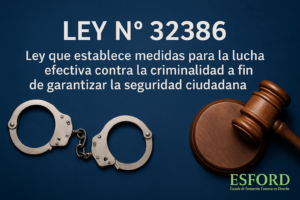ROOM SUPREME PRONOUNCED IN CASSATION
Secure guideline for motivation of judicial decisions From the case-law of the TC, the referee of the highest court warns that it is not enough consistency between premises and of the decision taken.
Referee of the highest court warns that it is not enough consistency between premises and of the decision taken.
So that a judicial decision is properly motivated is not enough that there is consistency between the premises (regulation and/or factual) and the decision taken, but additionally, it is required that these assumptions are adequately justified in the evidence acted and in the legal presumptions, which come to be the substitutes of the evidence.
So said the Supreme Court by the judgment corresponding to the Cassation N° 3364-2019 Lima, issued by your Room's Permanent Civil, by which states founded the appeal within a process of acquisitive prescription of dominion, setting a pattern for the motivation of judicial decisions.
Foundation
The hall of supreme sustains the precision that is performed, taking into account that around the right to the motivation of the judgments of the Constitutional Court (TC), in repeated cases, has noted that the right to a decision properly motivated “[...] it is a guarantee of the justiciable in front of the arbitrariness of judicial and ensures that decisions are not justified on the whim of the judges, but on objective data that provides the legal system or that are derived from the case” (STC corresponding to the File N°0896-2009-PHC/TC, foundation 07).
Also, the supreme court warns that in the STC corresponding to the File N° 02075-2021-PA/TC, foundation 04, the TC has stated that: “The motivation due to a court ruling [...] assumes the presence of certain minimum elements in the presentation by the judge of the reasons that substantiate the decision”.
“In the first place, the internal consistency, as an element that allows you to check if what you decide is derived from the premises laid down by the judge in its foundation. In the second place, the justification of the premises external, as an element that allows to see if the claims on the facts and on the law made by the judge are duly supported on the material, normative and based on the evidence presented by the court in its resolution”.
“In the third place, the sufficiency, as an element that allows to see if the judge has given the reasons that support the decision, according to the relevant issues to be determined by the judge, and are necessary for the solution of the case. In fourth place, congruence, as an element that allows to observe if the above reasons, respond to the arguments raised by the parties”.
“Finally, the special qualifications, such as a element that allows to see if the special reasons that are required for the adoption of a particular decision are set forth in the decision of the court in question. [...]”
To this, the referee supreme adds that the TC, in the judgment of the File N° 01480-2006-PA/TC, it stated that “the right of the motivation of the resolutions't matter that the judges, to absolve the causes, to state the reasons or objective justifications that lead them to take a certain decision. Those reasons are [...] must be [...]of the law in force and applicable to the case (...)”.
Of the above-mentioned case-law, the hall of supreme appears that for which a judicial decision is properly motivated, it is not enough that there is consistency between the premises (regulation and/or factual) and the decision taken, but that also requires that these assumptions are adequately justified in the legal system of material or procedural effect.
Rules
The hall of supreme also warns that in accordance with subparagraph (3del article 139° of the Constitution, the observance of due process and the guardianship court to constitute principles and rights of the judicial function. So, no person can be diverted from the jurisdiction of default by the law or subject to a different procedure for the previously established, or judged by special courts, or by special commissions created to the effect, regardless of its denomination, the precise constitutional rule.
Also, the hall of supreme warns, to tone with the item 5del cited article of the constitution, that another principle and right of the judicial function is the motivation of writing of the judgments in all instances, except the decrees of mere formality, with express mention of the applicable law and of the facts that support it.
Source: Peruvian
Date: 09/05/2024

















